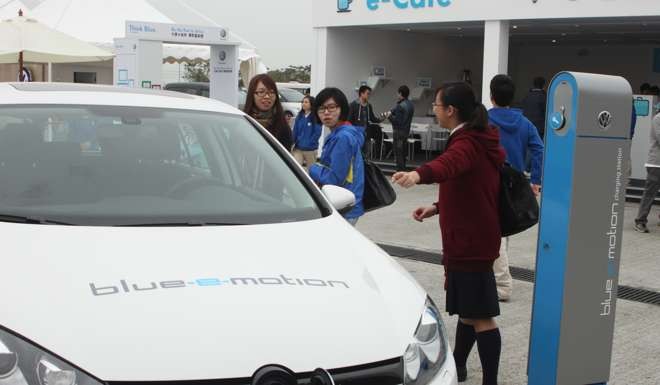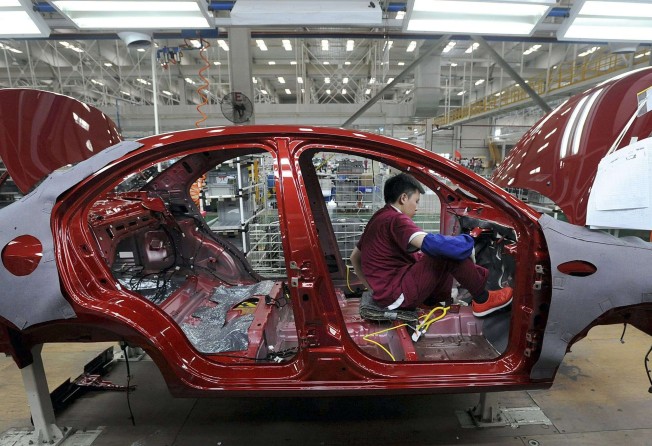
Volkswagen plans to use Jianghuai electric car plan to forge its third venture in China
Volkswagen and Jianghuai aim to research, develop, manufacture and sell electric vehicles aimed at the middle-to-high end of the China market

Volkswagen AG said it signed an accord with Anhui Jianghuai Automobile to explore the feasibility of producing electric vehicles in China, forming a third partnership in the world’s largest vehicle market and challenging a regulation that limits the number of Chinese partners foreign carmaker can have.
The venture, which doesn’t contain any specific investments or production details, will conduct research and development, manufacture, market and sell vehicles and components in the country, according to a press statement by the German carmaker’s China office.
The two companies may use their existing and future model platforms, as well as technologies, for the venture, President and CEO of Volkswagen Group China Jochem Heizmann said in the statement. Earlier, people familiar with the matter told the South China Morning Post that the venture will assemble electric vehicles at Jianghuai’s Hefei factory in Anhui province, aimed at the middle-to-high end of China’s vehicle market.
“This new partnership again demonstrates the seriousness of the foreign player in the Chinese electric vehicle market, and also the importance of being local to gain local consumer and government acceptance” said Raymond Tsang, a partner with global consultancy Bain & Co. “A China-for-China product strategy would also be very critical to win the mainstream mass market, and will likely enjoy a more competitive cost structure and a more local supply infrastructure.”
Trading of Jianghuai’s shares was halted in Shanghai on Wednesday, pending an unspecified agreement “that will have a significant impact on the company,” according to an earlier statement by the Chinese carmaker. Jianghuai’s shares have risen almost 23 per cent this year.
The new alliance will bolster the prospects of both carmakers and help them tap into the increasing popularity of electric cars, responding to government subsidies to cut vehicle emissions and reduce air pollution.
Still, it runs headlong into an existing regulation enforced by the National Development & Reform Commission, which limits foreign carmakers to having a maximum of two local partners if they want to establish car assemblies in China.
Any tie-up with Jianghuai will be Volkswagen’s third venture in China involving a local carmaker. Volkswagen owns 40 per cent of an assembly with FAW Car in northeast China’s Changchun city, making passenger cars under its own marque and under the Audi AG brand.
It has a separate venture making the Lavida passenger cars in Shanghai with SAIC Motor.
“It may take several years for the first car to get on to the market, while at the same time we need to see how authorities such as the NDRC would deal with it,”said Zhang Yu, managing director with market researcher Automotive Foresight. “There is a chance that new energy vehicle production is not going to be subject to the old restrictions on foreign auto brands’ production in China.”
The Denza, an electric car made through a venture between Chinese carmaker BYD and Daimler AG, carries a sticker price of 369,000 yuan (US$55,418) , while customers can buy it with a 100,000 yuan government subsidy.
That subsidy will end by 2020, which compels Volkswagen and Jianghuai to get into the game ahead of time, Zhang said.
“They may need to charge a relatively lower price then,” he said.

“For Volkswagen, it is of great importance for it to keep pace with China’s auto industry development, not just focusing on the profitability of its two ventures,” said Chen Peijun, a Shanghai-based engineer with US components maker TRW. “Electric vehicles is an area that Volkswagen must strengthen to tap the future growth of the world’s largest auto market.”
Sales of vehicles powered by alternative energy may more than double in 2016, amid a government programme to promote alternatives to internal combustion engines and reduce emissions, according to China’s minister for industry and information technology.
Volkswagen, saddled by a scandal of cheating on its vehicle emission standards, lags behind its Japanese and US competitors when it comes to developing electric cars. So far, it has an electric version of its bestselling Golf compact car called the e-Golf, and another model called the e-up.
“Volkswagen does not have truly cutting-edge technologies in developing electric cars,” Zhang said. “Volkswagen values Jianghuai’s strength in cost control, and in its large production capacity, given that BYD has already cooperated with Daimler for electric car production.”
Jianghuai produces trucks, vans,buses, passenger cars and components in China. Its first-half delivery increased 14 per cent to 333,639 vehicles. Sales of new energy vehicles more than tripled from last year, Jianghuai said, without specifying a number.